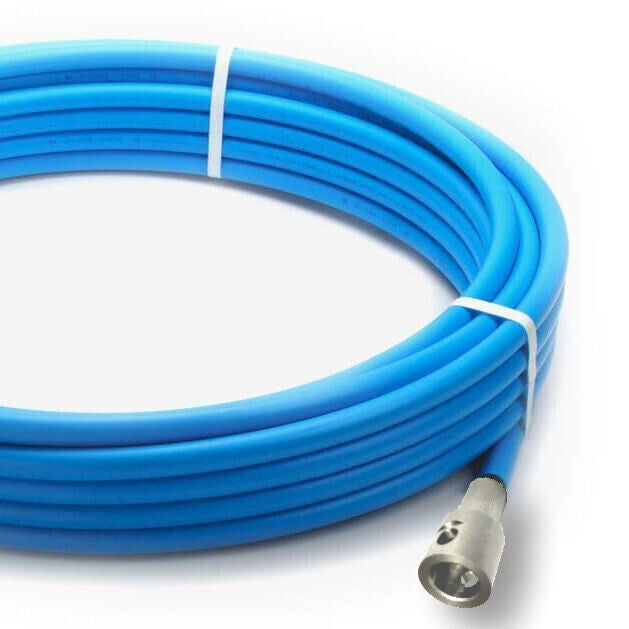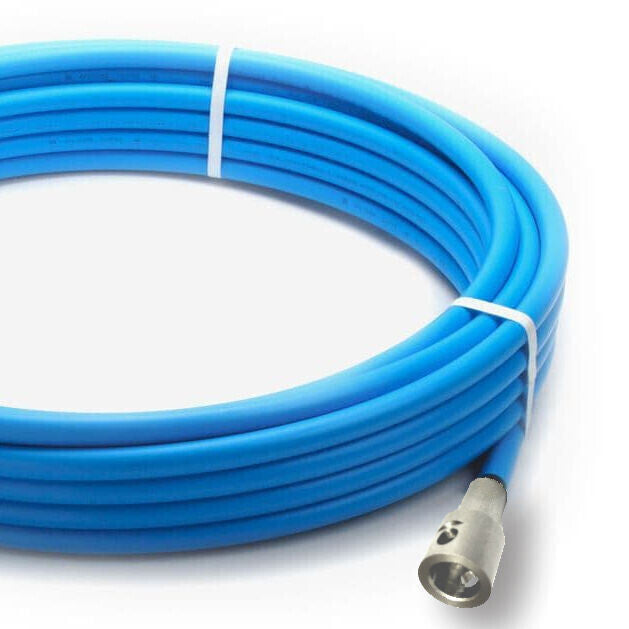Sewer Tools
102/204 Flexible Shaft Cable Set
102/204 Flexible Shaft Cable Set
Couldn't load pickup availability
Complete flexible shaft, sleeve and the 102 or 204 adapter to use with your 102/204 machine.
For your convenience, the 102/204 adapter is already crimped onto the flexible shaft for you so you don't need to hassle with getting a crimping tool.
The cable for the K9-102 is 15 meters in length and the shaft is 1/4" (6mm) in diameter, and the flexible shaft for the K9-204 is 20 meters in length and uses a 5/16" (8mm) diameter shaft.
THIS IS NOT AN ORIGINAL RIDGID FLEXIBLE SHAFT, WE DO NOT PROVIDE REPLACEMENT CABLES FOR THE RIDGID K102 or K204 sewer cleaning machine.
Our clients have reported that our flexible shafts are more rigid than their Ridgid cable, and they prefer this because the rigidity prevents the shaft from coiling on the inner diameter of their pipes when cleaning or removing blockages.
ALWAYS LUBRICATE YOUR SHAFT BEFORE FIRST USE
Aviation law prohibits us from delivering products which could be considered flammable so we send the shafts without lubricant in the sleeve.
Please be sure to lubricate your flexible shaft before using it, and then check the lubrication every few weeks. This not only ensures the longevity of your shaft, but also makes it more efficient over longer distances. Here is a video we made on how to lubricate your shaft:
Shaft thickness
The thickness of the shaft depends on the amount of bends that you would like to pass through. The more bends you need to get through, the thinner the shaft should be. However, the thinner the shaft is, the less torque the shaft delivers.
The 6mm (1/4") flexible shaft is most suitable for 50 mm (2") pipes and can manage to get through multiple bends, but has limited torque, so it is more suitable for blockage removal than descaling. (The 6mm will descale a pipe, but it would take longer to achieve results.)
The 8mm (5/16”) flexible shaft is our second most flexible shaft. It has the ability to pass through multiple bends, and has more torque than the 6mm (¼). This shaft is most suitable for pipes with a diameter of 75mm (3”) to 100mm (4”), and will work with blockage removal chains as well as descaling chains.
The 10mm (3/8") flexible shaft is less flexible than the 8mm (5/16) shaft, and yet more flexible than the 12mm (½”). This shaft will navigate through fewer bends than the 8mm (5/16) shaft, but will offer the user similar torque to the 12mm (1/2"). This shaft is suitable for pipes ranging from 75mm (3”) to 150mm (6”).
The 12mm (½”) flexible shaft is our most rigid shaft. This shaft is popular for failed liner removal since it offers the highest torque ratio. The shaft is perfect for descaling and blockage removal of lines ranging from 100mm (4”) to 200mm (8”)
Shaft length
Most clients insist on getting the longest shaft possible. Yet, on average, most of the blockages occur within 20 meters (65ft), and most clean outs are located 25 meters (80ft) apart. However, this is something that you would know more about since you have better knowledge of your specific clients needs. When you choose one of the recommended shafts, please be sure to keep this in mind.
The longer your shaft is, the less torque is delivered to the other end, since there is a slight loss in energy passed through the shaft.
Consider purchasing two shorter shafts with a shaft connector so that you have less to carry around on site, and when you need extra length, you could simply connect an additional shaft. In this way, you could also connect a thinner shaft to a thicker shaft to give you flexibility when needed as well as the torque to drive the thinner shaft.
Quality
The life expectancy and quality of a shaft depends on selecting the right design.
A flexible shaft is made by winding several layers of high quality spring-grade wire around a single mandrel. Each successive layer is wound onto the shaft at an opposing pitch angle. The quality of a shaft is determined by the wires used, their number, the diameter, and the annealing temperature.
Properties such as flexibility, torsional stiffness, power transmission, and performance under different speeds are influenced by the selection and adjustment of these fundamentals.
Meeting these basic prerequisites is the guarantee of long, consistent and reliable performance.
The shafts length is measured at the minimum length. We provide the shafts slightly longer than the minimum so that clients can attach their different size tools to the shaft.
Shaft shrinkage
When we manufacture the shafts we wind them in a long straight line. They are then wound onto a large diameter spool, and later cut into smaller pieces before we assemble them and deliver them to you. This means that when you first use your shaft, you might notice that the ends shrink a little. Usually this is more evident on the drill end. This is perfectly normal since the shaft is subjected to the stresses of multiple bends and torque for the first time. After the first inner strands of the shaft settle into their permanent position the shrinkage will cease. Usually this affects around 3” (75mm) on either end of the shaft. When you notice this, simply cut off the shrunken section with an angle grinder, and reconnect your chains and drill. It is not necessary to weld the ends, but if you prefer to do this please try to avoid too much heat on the shaft.
Points to note:
This product comes with only one friction ring on the one side then the adapter crimped on the other end.
These products are intended to be used by trained professionals in the sewer cleaning trade. They do not come with instructions. If you would like training please make contact with us, and we will guide you.
Product pictures may vary in color and design depending on the size and diameter that you order.


